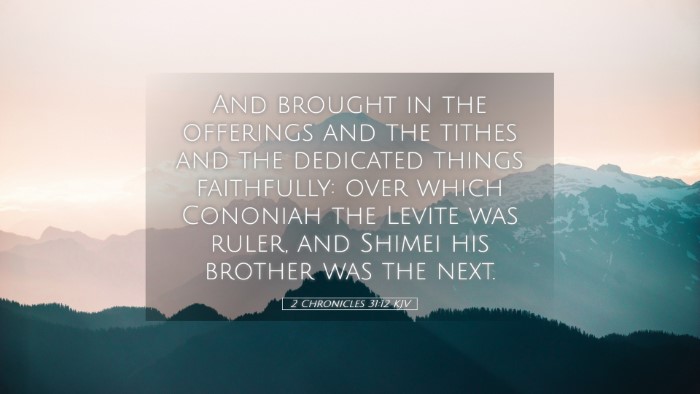Commentary on 2 Chronicles 31:12
Verse: 2 Chronicles 31:12 - "And brought in the offerings and the tithes and the dedicated things faithfully: over which Conaniah the Levite was ruler, and Shimei his brother was the next."
Introduction
This verse encapsulates a moment of faithfulness and dedication in the administration of offerings presented to God during King Hezekiah's reign. Through examining this text, we gain insight into the spiritual discipline surrounding offerings, the role of leadership within the Levitical priesthood, and the importance of faithful stewardship in the lives of God’s people.
Contextual Overview
The reign of King Hezekiah is marked by significant religious reforms aimed at restoring proper worship of Yahweh after a period of idolatry and neglect. Following the national observance of the Passover (2 Chronicles 30), Hezekiah initiates efforts to encourage the people to bring their tithes and offerings. This verse highlights the role of the Levites in overseeing the contributions, which reflects the organized system put in place for worship and service in the temple.
Insights from Matthew Henry
Matthew Henry notes that the faithfulness in bringing offerings stems from a responsive heart. He emphasizes that the people were stirred by revival to bring their tithes; their acts of giving were not mere obligations but were motivated by gratitude and obedience. Henry outlines the following key insights:
- Willingness to Offer: The offerings were brought in willingly, indicating a genuine desire to please God.
- Role of Leaders: Conaniah’s role as supervisor over these offerings indicates the importance of leadership in spiritual matters. Effective spiritual leadership is necessary to guide the congregation in worship.
- Order and System: The scripture reveals the orderly procedure in which the offerings were gathered and accounted for, underscoring God’s desire for order in worship.
Insights from Albert Barnes
Albert Barnes elaborates on the organizational aspects seen in the verse. He points out that the administration of offerings by appointed leaders like Conaniah displays a structured approach to service in the temple. Key observations from Barnes include:
- Faithfulness in Duty: Emphasizes the character of faithfulness in ministry roles — those charged with responsibility must ensure integrity and dedication.
- Community Participation: Barnes illustrates that this communal participation in offerings signifies collective worship and a shared commitment to God's covenant.
- Significance of Tithes: The tithes are highlighted as crucial to maintaining the temple and supporting the Levitical priests, reflecting a model for sustaining spiritual leadership.
Insights from Adam Clarke
Adam Clarke provides a more detailed theological understanding of the implications attached to offerings and their dedication to the Lord. Clarke’s comments emphasize:
- Spiritual Implications: He argues that the faithful bringing of offerings signifies deep spiritual insights into one’s relationship with God.
- Levites' Responsibility: Highlights the responsibility of the Levites as not just managers of goods but as facilitators of worship and spiritual guidance among the people.
- God's Provision and Care: The act of bringing offerings also displays a trust in God's provision for their needs; it was a physical demonstration of their dependence on Him.
Theological Implications
The study of this verse demonstrates essential theological principles regarding worship and leadership:
- God's Expectation of Faithfulness: Faithful stewardship is expected of God’s people; this extends beyond mere financial giving to encompass all aspects of life.
- Role of Community in Worship: There is an intrinsic communal aspect in worship; the act of giving is not individualistic but a shared expression of devotion.
- Leadership in Spiritual Matters: Appointed leaders play a crucial role in guiding the people toward fulfilling their responsibilities before God, indicating strong ecclesiastical governance.
Practical Applications
For pastors, students, and theologians, the lessons derived from 2 Chronicles 31:12 provide several practical applications:
- Encouragement of Generosity: Leaders should cultivate an environment that encourages generosity, reflecting the heart of the congregation towards faithful giving.
- Importance of Structure: Developing a structured system for offerings and stewardship can enhance accountability and trust within the church community.
- Teaching on Stewardship: Instruction on the importance of tithes and offerings within the broader context of faith and commitment can lead to deeper understandings of worship.
Conclusion
In 2 Chronicles 31:12, we witness a reaffirmation of the sacred act of giving, which is framed within acts of worship and community. The faithfulness represented in the contributions reflects deeper spiritual truths about our relationship with God, the importance of leaders in guiding these practices, and the need for orderliness and integrity in worship. As God’s people engage faithfully in these areas, they align with His desires and grow closer in relationship with Him.


